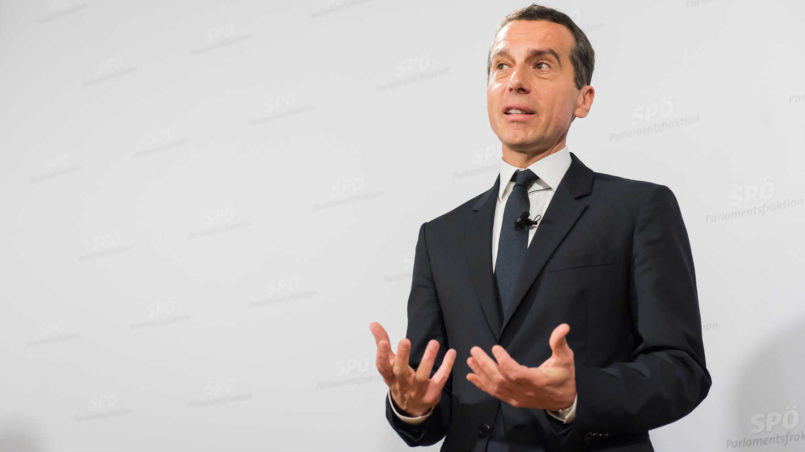Christian Kern’s seven points for a reorganisation of the European Union

Event data
- Datum
- 3. 7. 2017
- Host
- Österreichische Gesellschaft für Europapolitik
- Location
- Technische Universität, Wien
- Event-type
- Podiumsdiskussion
- Participants
- Christian Kern, Bundeskanzler von Österreich, zum Zeitpunkt der Veröffentlichung
- Franz Vranitzky, Ehemaliger Bundeskanzler von Österreich
On 3 July 2017, Chancellor Christian Kern presented his views on the necessary reorganisation of Europe during a discussion event of the Austrian Society for European Politics in the domed hall of the Vienna University of Technology. The event revolved around the question: “How do you consider Europe?”
After an opening speech on the contributions of the recently deceased former German Chancellor, Helmut Kohl, and the former foreign minister of the ÖVP, Alois Mock, regarding a common Europe, Christian Kern talked about the proposals on seven important subjects of Europe which are, according to him, necessary to further expand and guarantee pro-European solidarity.
1. It is pro-European to complete the Economic and Monetary Union
Sanctions for violations of budgetary disciplines are imposed, but when unemployment increases greatly, when social systems break down or there is no education for young people, there are no consequences. Therefore, the European Union (EU) does not only need mandatory targets regarding the public debt and inflation, but also guidelines for unemployment, investments and social minimum standards.
2. It is pro-European to fight for fair taxation
It is not acceptable that large companies do not pay their taxes and move their profits to tax havens. In order to fight against unfair tax competition and to maintain the European fundamental idea of equal conditions, the common tax base for corporate taxes has to be introduced at last. But consideration should also be given to the idea of harmonising tax rates as well. Only in this way can a damaging race to the bottom be met.
3. It is pro-European to consistently fight wage and social dumping
Nowadays people in Europe are still being taken advantage of with poverty-level wages. If, for example, the domestic market and the freedom of services lead to social and wage dumping, European citizens experience this as a threat. The currently discussed changes of the Posted Workers Directive finally have to be implemented; they are a first step. But the cooperation of national authorities regarding the cross-border pursuance of violations also has to improve. This would also be a classical function for the EU in the social interest of citizens.
4. It is pro-European to support convergence
The expenses of the EU budget should focus more on growth-inducing investments. An increase in investments would lead to more sustainable growth and employment as well as increasing convergence and cohesion. We need a shift away from the budgetary priorities towards future investments, such as education, research, infrastructure. For this, new instruments are necessary. In addition Jean-Claude Juncker‘s plan regarding his European fund for strategic investments, the EU should also establish a European fund for public investments, in which it is jointly decided where investments are necessary.
5. It is pro-European to demand a fair trade policy
Europe is interested in trade and open markets which are as unrestricted as possible – according to Kern, he, as the Austrian Chancellor, can only support this. Austria has a very open national economy and Austria profits from free trade just as much as from European integration.
We, as Europeans, cannot be naive regarding our trade policy. If we do not defend ourselves against the unfair competition directed at us, we would, in a couple of years, no longer have a raw materials industry in Europe. We are threatened with missing the boat in strategic key industries, such as robotics and microelectronics.
Christian Kern shares the discomfort of many Austrians as regards the unilateral special rights for investors. In a discussion on CETA and TTIP, the government has already carved out the problematic points of this new comprehensive agreement. As long as there is no satisfying solution, such trade agreements, like CETA, will also not be ratified. Thereby the trade policy parts of CETA are temporarily applicable, but not the investment courts. As such the trade agreement and all its rules are governed by the Austrian jurisdiction and Austrian laws.
6. It is pro-European to rigorously defend the community of values
Kern’s concrete suggestion was to tie payments of the EU to the compliance with constitutional fundamental principles. If appeals do not have an effect, perhaps the money of the EU, as a last resort, will lead to a change in thinking.
7. It is pro-European to also divide the burden of migration
In the short term, Europe needs solid protection of its external borders, control of the refugee routes and a division of the burdens. Leaving this problem to the Italians, Greeks, Germans, Swedes and Austrians will not work.
In the long term, the Union has to change the living conditions in the countries of origin and in the transit countries, so that people find new prospects there. Therefore, we need some kind of Marshall-Plan for Africa. The Commission has already taken the first steps. Now the member states, including Austria, are being called upon. This costs both time and money, but it is the only realistic chance to deal with this.
Christian Kern works to ensure that Austria will contribute for those who expect more than a domestic market from Europe. One will work together with those who want to build a strong, fair and supportive Europe. Kern ended his talk at this point and a discussion with former chancellor, Franz Vranitzky, regarding this issue began.
Credits
| Image | Title | Author | License |
|---|---|---|---|
 |
en: Christian Kerns sieben Punkte für eine Neuordnung der EU | SPÖ Presse und Kommunikation | CC BY-SA 2.0 |
